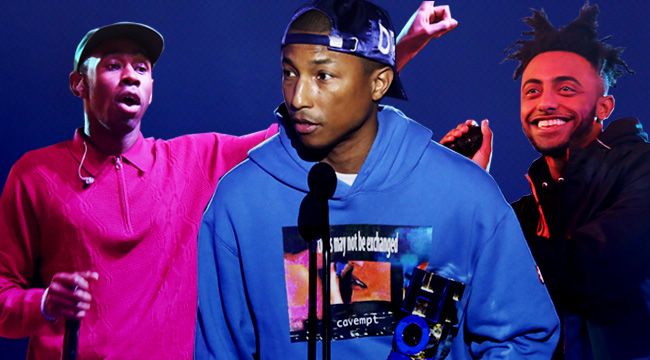
Pharrell Williams has always been ahead of his time.
Now, when I say that, it could mean that he’s ahead of his time in a lot of ways. He could be “hard to grasp” in his conception and execution of certain ideas, such as the way he envisioned his style and presentation. Back in the early aughts, he was considered a “weirdo,” with a goofball commitment to streetwear and anime that average hardcore hip-hop head wouldn’t come to understand until late in the decade. He could be “futuristic”; the sounds that he used as a member of production duo The Neptunes tended toward synthy and upbeat, at a time when the majority of hit hip-hop records tended to live in the midtempo range, using samples of soul loops and ’80s pop smashes to build their sonic landscapes.
But really when I say that Pharrell Williams was always ahead of his time, I’m talking about an observation I made to myself recently: nearly every hip-hop album released in 2017 reminds me in some way of Williams’ oft-maligned In My Mind. You can hear the DNA of that album all through the diverse releases of the last 12 months, from the obvious comparison of Tyler The Creator’s Flower Boy to more overlooked fare like Amine’s Good For You. Going back and relistening to In My Mind, I was struck by how fresh it sounds, at least for the first 30 minutes or so, like it could have come out only last Friday and fit in perfectly alongside the year’s most potent and colorful hip-hop hits.
That isn’t to say that Pharrell is the only influence, but over a decade later, his solo debut’s sounds and concepts permeate the hip-hop world.
It isn’t just the fact that Pharrell was both singing and rapping two years before 808s And Heartbreak, the album largely credited with first inspiring Drake’s moody, melodic style, was released, though that’s a part of it. From More Life to DAMN. to Future/HNDRXX, even Vince Staples’ genre-bending Big Fish, sometimes-strained-but-always-honest vocalization has become a must-have for any rapper’s toolbox. Although sing-song delivery was a part of many prior MCs’ arsenals, including Ja Rule, 50 Cent, and Nelly, those rappers’ lyrical diction was largely simple and straightforward.
Meanwhile, Pharrell, who by In My Mind was a ten-year mic veteran thanks to his work with Teddy Riley and Surrounded By Idiots, his Tribe Called Quest-aping group project with fellow Virginians Timbaland and Magoo, brought both ferocity and complexity to his raps, proving that complex, intricate lyricism could stand alongside straight-up R&B with songs ranging from the braggadocios “How Does It Feel?” to the surprisingly raw “Our Father,” with the perfect yin-yang blend of both forming the album’s centerpiece, “That Girl,” with Snoop Dogg and Charlie Wilson.
However, it’s not just the combination of cerebral, dense rhymes with catchy, soul-filled choruses that filtered down through the years. In My Mind‘s clattering pianos, swaggering drum rolls, and sampled yelps form the sonic backbone of the front half of that album, and are immediately mirrored in the construction of many of this year’s strongest offerings.
Consider Tyler The Creator: It’s no secret at all that the erstwhile founder of Odd Future is heavily influenced by Pharrell’s work. Many of his earlier compositions drew the comparison, and the pair has collaborated on nearly all of Tyler’s project since the one-time teen rabble-rouser came to prominence. Tyler himself even penned an extensive essay on the tenth anniversary of In My Mind, specifically crediting “You Can Do It Too” with giving him the confidence to conceive and execute his ideas for Odd Future
So it should come as no surprise that songs from 2017’s Flower Boy, hailed as Tyler’s most mature project to date, sound like they would fit right in on In My Mind. “Pothole” sounds so much like “You Can Do It Too” that the songs could practically be swapped and not ruin the flow of either album or even stand out much aside from the clear vocal differences between Pharrell’s lightweight rasp and Tyler’s barrel-chested growl. Likewise, the same could be said of “Boredom,” the Flower Boy standout whose drums could sub in for any of those in the first half of In My Mind.
Compare “Boredom” with “Sundays” from Amine’s breakthrough Good For You Motown debut, and the result is the same. The slowed-down breakbeat and hazy synth keys provide an interchangeable backdrop that allows the Portland rapper to cover similar subject matter, with just as much verve and laid-back assurance as Tyler. Meanwhile, one of the standout tracks from Good For You, “Dakota,” features favorite Pharrell collaborator Charlie Wilson, whose affinity with hip-hop artists dates back to his work on In My Mind, and the plinking keys of “Beach Boy” come right out of Williams’ playbook.
In 2006, In My Mind began to chip away at the staid image of gangsta rap, just before Kanye West’s Graduation came to utterly shatter the hypermasculine stereotype of rappers only a few months later. While Kanye receives the majority of the credit, much of it rightfully so, there’s no way Graduation could be as well-received if not for In My Mind and Pharrell’s massive rap Rolodex had not laid the groundwork, demonstrating how to play with and twist the genre’s well-defined edges into new forms without fear of the weirdo label. In My Mind wasn’t particularly beloved when it dropped, with complaints of unoriginality (tuh) and predictability, but I dare you to revisit that album in 2017. Suddenly, musical choices that had you asking “WTF?” in ’06 will start to make such perfect sense that you’ll wonder why you didn’t see it before. It was because Pharrell was already here, just waiting for the rest of us to catch up.






